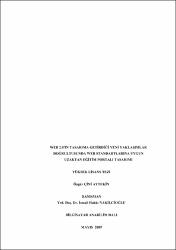| dc.contributor.advisor | Nakilcioğlu, İsmail Hakkı | |
| dc.contributor.author | Aytekin, Özgür Çini | |
| dc.date.accessioned | 2019-05-28T12:36:43Z | |
| dc.date.available | 2019-05-28T12:36:43Z | |
| dc.date.issued | 2009 | |
| dc.identifier.uri | http://hdl.handle.net/11630/6233 | |
| dc.description | As the conventional education fails to meet the demands of modern education, it has
caused some concepts to come out like distance learning. Distance learning combines
the elements of “face to face education” and “education every time and everywhere”.
Along with the increase in the use of computer technologies in distance learning, visual
design has come into prominence. Parallel to this, thanks to the developing education
softwares, educators in collaboration with designers have needed to develop education
material. The prepared education materials enable the students to learn faster and more
easily without place and time constraints. As well as the content of the education given,
the way the education is provided is also significantly important. In the design of the
web pages, employing the visual elements effectively and applying the web standards
increase the productivity and the speed in distant education, and turn the education into
a funnier and lasting fashion. In the design of the Distance Learning Portal of Afyon
Kocatepe University prepared through adopting the new approaches and technologies in
designing brought out by Web 2.0, it is aimed to increase the users’ social interaction
and to allow the users of an opportunity to share information. Firstly, in the coding of
the pages CSS and XHTML technologies have been made use of by separating structure
and the presentation, and then by fulfilling the web standards completely, the austerities
such as access into the content and pages have been reduced to minimum level, and
lastly, the ease of use has been achieved by categorizing the menus connected to each
other. | en_US |
| dc.description.abstract | Geleneksel eğitimin çağdaş eğitim talepleri karşısındaki yetersizliği uzaktan eğitim
sistemi gibi olguların doğmasına neden olmuştur. Uzaktan eğitim “yüz yüze eğitim” ile
“her zaman her yerde eğitim” unsurlarını birleştirmiştir. Uzaktan eğitimde bilgisayar
teknolojilerinin kullanımının artmasıyla görsel tasarım ön plana çıkmıştır. Buna paralel
olarak gelişmekte olan eğitim yazılımları sayesinde eğiticiler ve tasarımcılar birlikte
çalışarak eğitim materyali geliştirme ihtiyacı duymuşlardır. Hazırlanan eğitim
materyalleri, öğrencilerin daha hızlı ve kolay bir şekilde, yer ve zaman kısıtlaması
olmadan öğrenebilme imkanı tanıyabilmektedir. Verilen eğitimin içeriği kadar, bu
eğitimin nasıl verildiği de önemlidir. Web sayfalarının tasarımında, görsel öğelerin
etkin olarak kullanımı, web standartlarının uygulanması, uzaktan eğitimde verimliliği ve
hızı arttırmakta, öğretimin daha eğlenceli ve kalıcı bir şekil almasını sağlamaktadır.
Web 2.0’ın, tasarıma getirdiği yeni yaklaşımlar ve teknolojiler uygulanarak hazırlanan
Afyon Kocatepe Üniversitesi Uzaktan Eğitim Portalı Tasarımında kullanıcıların sosyal
etkileşimini arttırmak ve bilgi paylaşımına olanak sağlamak hedeflenmiştir. Sayfaların
kodlanmasında CSS ve XHTML teknolojileri kullanılarak yapı ve sunum birbirinden
ayrılmış, web standartlarına tam uyum gerçekleştirilerek içeriğe ve sayfalara erişim gibi
güçlükler minimum düzeye indirgenmiş, birbiriyle bağlantılı menüler sınıflandırılarak
kullanım kolaylığı sağlanmıştır. | en_US |
| dc.language.iso | tur | en_US |
| dc.rights | info:eu-repo/semantics/openAccess | en_US |
| dc.subject | Uzaktan Eğitim, Web 2.0, Web Standartları | en_US |
| dc.title | Web 2.0’ın Tasarıma Getirdiği Yeni Yaklaşımlar Doğrultusunda Web Standartlarına Uygun Uzaktan Eğitim Portalı Tasarımı | en_US |
| dc.title.alternative | Designing Distant Education Portal Matching Web Standards In Accordance with New Approaches Brought Into Design By Web 2.0 | en_US |
| dc.type | masterThesis | en_US |
| dc.department | Fen Bilimleri Enstitüsü | en_US |
| dc.identifier.startpage | 1 | en_US |
| dc.identifier.endpage | 99 | en_US |
| dc.relation.publicationcategory | Tez | en_US |



















